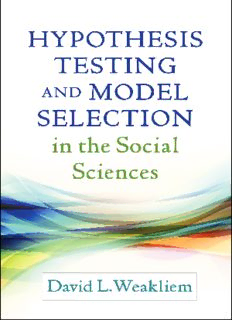
Hypothesis Testing and Model Selection in the Social Sciences PDF
Preview Hypothesis Testing and Model Selection in the Social Sciences
ebook THE GUILFORD PRESS Hypothesis Testing and Model Selection in the Social Sciences Methodology in the Social Sciences David A. Kenny, Founding Editor Todd D. Little, Series Editor www.guilford.com/MSS This series provides applied researchers and students with analysis and research design books that emphasize the use of methods to answer research questions. Rather than emphasizing statistical theory, each volume in the series illustrates when a technique should (and should not) be used and how the output from available software programs should (and should not) be interpreted. Common pitfalls as well as areas of further development are clearly articulated. RECENT VOLUMES DATA ANALYSIS WITH Mplus Christian Geiser INTENSIVE LONGITUDINAL METHODS: AN INTRODUCTION TO DIARY AND ExpERIENCE SAMpLING RESEARCH Niall Bolger and Jean-Philippe Laurenceau DOING STATISTICAL MEDIATION AND MODERATION Paul E. Jose LONGITUDINAL STRUCTURAL EQUATION MODELING Todd D. Little INTRODUCTION TO MEDIATION, MODERATION, AND CONDITIONAL pROCESS ANALYSIS: A REGRESSION-BASED AppROACH Andrew F. Hayes BAYESIAN STATISTICS FOR THE SOCIAL SCIENCES David Kaplan CONFIRMATORY FACTOR ANALYSIS FOR AppLIED RESEARCH, SECOND EDITION Timothy A. Brown pRINCIpLES AND pRACTICE OF STRUCTURAL EQUATION MODELING, FOURTH EDITION Rex B. Kline HYpOTHESIS TESTING AND MODEL SELECTION IN THE SOCIAL SCIENCES David L. Weakliem Hypothesis Testing and Model Selection in the Social Sciences David L. Weakliem Series Editor’s Note by Todd D. Little THE GUILFORD pRESS New York London © 2016 The Guilford Press A Division of Guilford Publications, Inc. 370 Seventh Avenue, Suite 1200, New York, NY 10001 www.guilford.com All rights reserved No part of this book may be reproduced, translated, stored in a retrieval system, or transmitted, in any form or by any means, electronic, mechanical, photocopying, microfilming, recording, or otherwise, without written permission from the publisher. Printed in the United States of America This book is printed on acid-free paper. Last digit is print number: 9 8 7 6 5 4 3 2 1 Library of Congress Cataloging-in-Publication Data Names: Weakliem, David L., author. Title: Hypothesis testing and model selection in the social sciences / David L. Weakliem. Description: New York : Guilford Press, [2016] | Series: Methodology in the social sciences | Includes bibliographical references and index. Identifiers: LCCN 2015043221 | ISBN 9781462525652 (hardcover) Subjects: LCSH: Social sciences—Statistical methods. | Statistical hypothesis testing. | Social sciences—Methodology. Classification: LCC HA29 .W395 2016 | DDC 300.72/7—dc23 LC record available at http://lccn.loc.gov/2015043221 In memory of Herbert A. Weakliem (1926–2015) Series Editor’s Note Why do so many false dichotomies exist, I wonder? Frequentist versus Bayes- ian seems to be one. Granted, the two camps have very different histori- cal roots and some purveyors of either camp have strong agendas. David L. Weakliem provides us with an amazing interplay of depth and balanced com- parison between these two major traditions. His vast experience is clearly evident as he walks us through meaningful examples without creating a sense of right versus wrong; rather he instills the simple yet important value that the approach to be used is that which serves the analytical goals at hand. By grounding the statistical theory in its philosophical origins, Weakliem teaches us one of the most important things we all should learn about sta- tistics: how to think, instead of what to think. Weakliem carefully provides arguments that highlight the utility of both frequentist traditions and Bayes- ian practices, and without advocating for either the status quo or radical rev- olution, crafts a guide to how traditional practices can be wedded to Bayesian ideas to improve scientific discovery. Weakliem also underscores another important feature of being a thoughtful researcher, namely, model selection. In the world of confirma- tory modeling, there appears to be a lack of appreciation for the importance of testing competing models and determining which to select from a set of possible models. Selecting the appropriate model is a critical issue of social justice, since the model selected is the one that will inform both policy and vii viii Series Editor’s Note practice. Weakliem is a strong advocate of principled and thoughtful applica- tion of all our modeling techniques. Wealkiem is like a master chef who explains the relations among all the elements of cooking without providing you with a single recipe. You are given all the ingredients and the principles of combination that allow you to create your own recipe—one that is the perfect combination for the research meal you desire to create. He shows us how to create such masterful works by walking us through real research questions with real data. One final feature of this book that I love is the wonderful set of bibliog- raphies that Weakliem has assembled at the end of each chapter. This book is bound to be a mainstay reference guide to model selection, specification, estimation, and evaluation, and the bibliographies are rich fodder to feed the intellectual hunger that he elicits in each chapter. They are a qualifying- exam’s worth of influential readings that graduate students should take full advantage of. And, of course, put Weakliem’s book on your exam’s reading list, because it really will be your roadmap going forward. As always, “enjoy!” Oh, and “make good choices.” Todd d. LiTTLe Snowbound in Boise City, Oklahoma
Description: